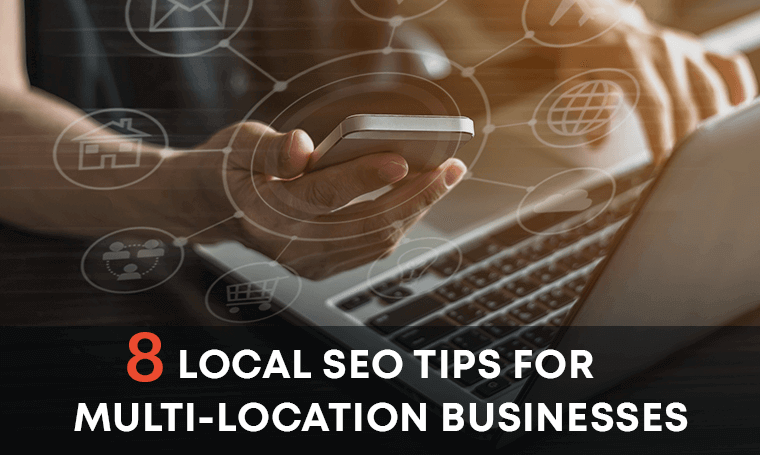8 Local SEO Tips for Multi-Location Businesses

If you’re still new to the world of digital marketing, you’ve probably come across a ton of confusing terms related to Search Engine Optimization. You may have heard terms such as LSI, Onpage SEO, link building, Google My Business, and content marketing. In this cloud of SEO terms, it’s easy to lose focus on the real benefit that effective SEO services offer – they generate more leads locally, regionally, or nationally, AND can help move more inventory with a great eCommerce SEO strategy.
This article breaks down 8 relevant local SEO strategies for companies, brands, restaurants, and service providers that run multi-location businesses.
What is Local Search Engine Optimization?
Anything that is done to ensure that you are more visible when people in your local service area search for products and services related to your offering, is local SEO. How is local SEO different from SEO? Well from a marketing and sales perspective, there’s not much difference. While SEO is a bucket term for everything that is done to improve visibility on search engines for your brand/product/services words, local SEO deals with the same outcome in a finite geographic area. This area can be a ZIP code, a city, a town, multiple cities, part of a state, a full state or multiple locations across multiple cities in your country. So if you’re a restaurant selling yummy Mediterranean dishes out of Canton, OH, Cleveland, OH, Charlotte, NC, and Raleigh NC, you may be looking for either a local SEO company or an expert who understands and implements best local SEO practices.
While there are a multitude of factors affecting local search engine presence (or presence on Google Maps and Google Plus), in this article we will dive down deep into the world of multi-location businesses, their SEO hurdles, and how to overcome the challenges that keep you from achieving those coveted top-ranking positions on Google.
- Multiple Websites vs. One Website – It can be complicated for businesses to choose a correct website strategy for multiple locations. While it may sound tempting to use multiple websites (one for each location), remember that this could require a Herculean SEO effort to rank separate websites for each location. Why? It’s because Google calculates your domain’s authority and relevance individually. This means if you’re offering handyman services in both Houston and Austin, Texas, your site will achieve different rankings in each of those cities. How high you manage to rank will be determined based on the quality of your content, originality of your content, and the number of links pointing to your website.Having multiple sites requires you to replicate success across all your store/business locations, and also deliver solid online marketing results across all locations. Instead, we suggest you to have one unified business website, with a separate page for each and every location. If you’re selling varied services or products, you may need a dedicated page for each service and location. So let’s illustrate that with the help of this visual. A company selling Roofing Services in both Myrtle Beach and Charleston, South Carolina may need the following pages to attract the attention of visitors in those areas:
- Asphalt Shingle Roof Repair Services in Myrtle Beach
- Asphalt Shingle Roof Repair in Charleston
- Metal Roofing Company in Myrtle Beach
- Metal Roofing Company in Charleston
and so on and so forth. It’s best to organize your services or products in a hierarchical folder structure such as www.example.com/charleston/shingle-roof-contractors.html.
- Create REAL Local Content – The web is rife with examples of thin content. Thin content means shallow content that doesn’t really help your website visitors. This shuns Google off too, and then Google won’t rank you higher on its results page. It’s important to create real local pages with real local content. Some ideas that always help are:
- Photos of work you’ve done in that location – If photos are clicked in a location and you have a page for that location, put that photo with a nice caption there. Add the name of the city and the name of your service in the caption. Leave the photo’s XF data, which helps Google understand the location among other things for that photo.
- Photos of your people and your offices – Add photos of people who work for your business in that location. This not only helps Google identify your ingenuity, but it also helps users who visit your website see the human face of your company. People like to transact with people who they know and like. Putting real photos is the first step to establishing your credibility.
- Tell about the cities – If you have multiple office or business locations, it helps users when they know you understand their lingo. Do this by adding directions in colloquial terms along with a location map picture.
- Never just swap city and state names and leave everything else as a carbon copy on each of your local pages. This strategy is doomed for failure, and Google will catch on to these “thin” pages known as doorway pages of your website.
- Claim your Google My Business Listing for Every Location – You may already be doing this, but if not, this is the Holy Grail of local SEO! Google My Business is THE most important local SEO tool. It’s even more important than having your own business website, if you want real local visibility in your target area. Register for GMB listings in every location and claim your listing. You should create a business account, and then delegate the management of each location to the person managing your business location. If you work with a local SEO company like Cibirix, we can set up all your locations for you. If your business has more than 10 locations, you can import your locations and manage them on Google My Business using Bulk Location Import and Bulk Verification.
- Advertise on Google My Business – While it takes a little marketing budget to advertise on Google Local, the investment is well worth the cost. When you advertise on Google Maps, you are showing your ad to people who are searching for products and services that you offer. Alternatively, if you’re in a service business, folks may be looking to evaluate a company such as yours in your local area. Refer to this excellent article which delves into the details of setting up Google Adwords for local business. In the article, Maggie Aland also provides a link to a step-by-step guide on how to receive a free $150 credit for running your ads on Google.
- Sponsor Local Events and Good Causes – If you sponsor a charity in your area, that will help to build your local brand. People in your area will see you in a positive light, and the press and media surrounding your sponsorship will help you establish your position as a recommended business in your city. And it’s not just about sponsorships, either; donations for worthy causes can also help develop the right messaging for your business. Another location-specific thing you can do to improve your presence is to communicate your participation in local events through media like https://www.meetup.com or Facebook events. You can also use Linkedin Local to that end.
- Build Links for Every Location Page on Your Website – Your location pages should be real. They should be the hub of your activities in your office locations. It makes sense to have a location-specific Facebook feed show up on your location page. If you have a directory or an aggregator-like service, write insightful articles for them. Do not write simply to try and “get links.” Write to help people uncover important aspects of your products or services. Connect the dots to show how your services can meet people’s felt needs. One other effective strategy is to find and get in touch with local influencers. If you’re in the restaurant category, for example, local influencers such as food bloggers can help you get your name out. In the same breath, reach out to anyone who has used your service and been satisfied. Ask them to review your business on that page, or link to the city-specific reviews from the location page.
- Schema markup – Applicable to sites with either single or multiple business locations, your schema markup will tell loads about your location to Google. The biggest reward comes in the form of higher rankings for local searches. Isn’t that what you want? Within Google’s search console (formerly known as Google Webmaster Tools), there is a helpful and non-technical feature that lets you tell Google more about your location, your articles, phone numbers, opening hours, ratings on review sites, and much more. Previously, you needed to have some technical programming (or at least HTML) skills to be able to work with the core structure of your website and implement schema tags using JSON-LD or hCards. Now, it’s as easy as highlighting text on your page (within the search console) and telling Google what that content means. Explore Data Highlighter.
- NAP Consistency and Local Reviews – When you list your website in directories or review websites, it’s important to use the correct business Name, Address, and Phone Number (NAP). This must be correct down to a tee. If you share your phone number in the following format – (980) 392-2833 – keep it consistent across all channels. Do not remove the hyphen or parentheses. What is the gold standard? Obviously, it’s your listing in Google My Business. If you use a country code there (or don’t), then use it everywhere (or nowhere), including any place you mention your phone number on your website.
Another important point to strive for is getting local reviews. As noted in point 6 above, encourage your local customers to leave reviews. If you have programming skills or partner with a company that programs, ask them to feature these reviews on your location pages. It’s a great practice to use schema markup to highlight these reviews so that Google will find them and attribute them to the source and the location. If you have tons of reviews, feature the most recent or most important ones on your location page, and then link to an “All Reviews” page either on or off your website. You can also use a review aggregator service such as Shopper Approved or Trust Pilot.
Successful Local SEO Strategies with Cibirix
Do you want to reach more customers in your area? Our SEO strategies will enhance your local search engine presence. Cibirix can help you attract more customers in your city/region, and boost revenue for your business. We’re experts in local SEO, as well as in all other facets of digital marketing. We have local SEO experts on staff who can help you strategize the best local search engine visibility strategy for your business. Local SEO has evolved over time, and will continue to do so. It’s important that a local SEO company has the ability to adapt to the changing SEO sphere and still produce local visibility, without burning a hole in the customer’s pocket. Our local SEO plans start as low as $450 a month, after your initial investment. Contact Cibirix
About Author

Anoop Namdev
Anoop Namdev serves as one of the lead SEO Analysts for Cibirix. He is passionate about his pursuit of SEO, local SEO, eBay advertising, and Craigslist marketing excellence for business clients. Digital media is one of Anoop’s native tongues, and he specializes in helping local businesses to expand their business online through strategic local SEO efforts. When he’s not busy strategizing, Anoop can be found in attendance at some of his favorite public events. He also likes to paint in his free time.

